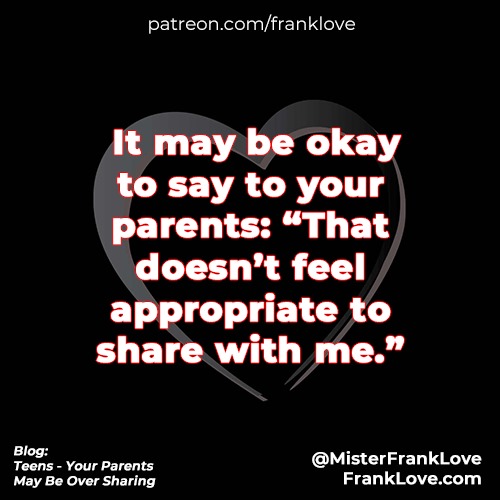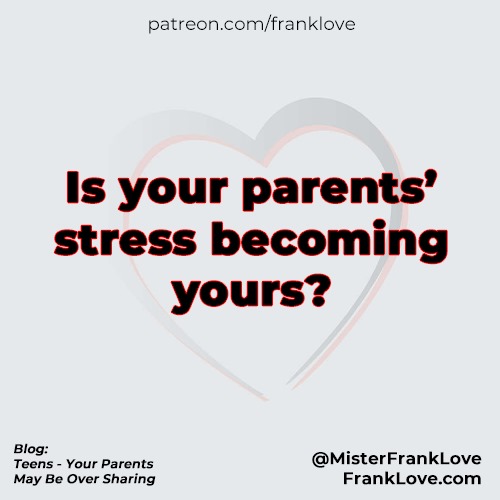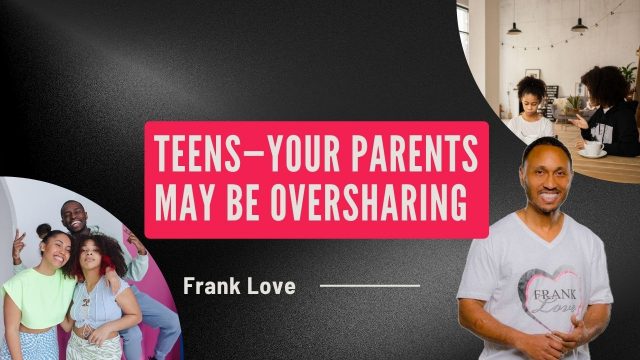
Misplaced emotional burdens can create unnecessary stress.
In my previous post, “Oversharing with Our Children,” we discussed how parents mistakenly position kids in adult roles that they aren’t mature enough to play.
Teens, let’s have a conversation. I’m speaking to you directly because you matter and because there’s something you might not realize: Sometimes your parents may be oversharing with you. This isn’t about judging them or making you suspicious of them. It’s about giving you perspective and helping you grow into emotionally healthy adults who can one day raise emotionally healthy kids.
Your parents are doing the best they can. Most are simply passing down what they saw their parents do—or reacting to what they didn’t see. Some may never have witnessed parents interact with one another in a healthy manner, and now they’re improvising. Parents’ intentions are often rooted in love; however, their approach may not always be what’s healthiest for you.
What Oversharing Looks Like
Oversharing is when a parent tells their child things that, in my humble opinion, are more appropriate to share with another adult. It can take many forms: telling you about their relationship problems, venting about financial stress, talking negatively about family members, or even involving you in adult conflicts.
It might feel like they’re being honest with you. Honesty is good. However, there’s a difference between honesty and burdening. Oversharing crosses that line. It places an adult emotional weight on your shoulders, weight you weren’t built to carry yet. And it can quietly shape how you view relationships, parents, trust, and even yourself.
Why It Happens
Parents sometimes overshare because they’re looking for support. They may be lonely, stressed, or simply unaware that they’re crossing a boundary. They might also think they’re helping you grow up faster or preparing you for the “real world.”
But childhood and adolescence are your time to develop emotionally without carrying adult responsibilities, opinions, assumptions, frailties, and unresolved issues.
How It Can Affect You
Hearing and experiencing adult problems before you have the maturity and emotional tools to process them in a healthy manner can cause stress, resentment, anxiety, and even guilt. You might feel like it’s your job to fix your parents’ issues or keep them emotionally stable. That’s not your job.
Being treated like a “mini therapist” can also blur and confuse boundaries in your future relationships. You may become overly protective of your own emotions and experiences and then struggle to open up at all because you fear repeating the perceived experiences of your predecessors.
What You Can Do
First, recognize that oversharing is about your parents’ misplaced needs, not your worth or maturity. It doesn’t mean they don’t love you or that you’ve done something wrong.
Second, give yourself permission to say, “I don’t know if I’m the right person to talk to about that,” or “That sounds like something you should talk about with another adult.”
And third, find safe older people who can relate to what you’re experiencing. Talk with responsible mentors, school counselors, coaches, or trusted adults. Healthy relationships with supportive adults will help you stay grounded while your parents work through their own stuff.
One Day, You’ll Be the Parent
Someday, you might be the one raising kids. And this is why I’m talking to you now. The seed I want to plant is simple: Protect your children’s emotional space. Let them be kids while they’re kids. Build their confidence and resilience gradually, without loading them down with adult worries too soon.
Breaking the cycle starts with awareness. You can be the generation that breaks the cycle of emotional burdens being passed down. You can create a healthier, more loving family culture for your future children.
Closing Thoughts
Your parents undoubtedly love you. They may just be figuring things out as they go. But love also means learning when to protect someone from things they don’t need to carry yet.
You deserve that protection. One day, your children will too.
Want More?
If this message resonated with you, sign up to receive my weekly blog, Creating a Loving Culture in Our Relationships.
Don’t forget to sign up to receive this blog each week so we share how to create a loving culture in our relationships.
Also, comment, like, and share.
Together, let’s create a loving culture in our relationships.
In my next blog, “I Am the Prize,” I will talk about how recognizing the value of both partners is the key to a healthy, meaningful relationship.
Support This Work
If you found this message valuable, share it. Like it. Subscribe. Comment.
And if you want to support this ongoing work, you can become a patron for as little as $2 a month at patreon.com/franklove.
In my next blog, “Teens—Don’t Involve Your Children in Your Disagreements,” I will talk about how teens can break the cycle of inappropriate parental behavior and safeguard their children’s emotional well-being.
Watch my video Teens — Your Parents May Be Oversharing Related to this blog.
Keep Rising,
Frank Love
Creating a Loving Culture in Our Relationships


